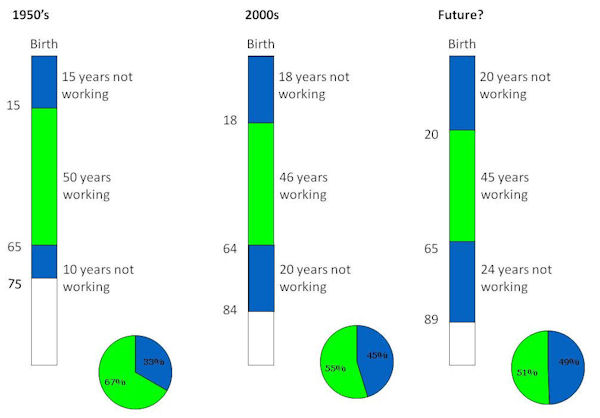Rising state pension age is not a penalty on the young
5 December 2013
- Rising state pension age is not a penalty on the young – it’s an opportunity to embrace a new type of retirement
- Retirement needs to change – it is not an aspiration to live on a state pension for over 30 years!
There is much angst this morning about the Chancellor’s suggestion of increasing state pension ages for younger generations. Quite frankly, the concerns seem based on out of date ideas about the nature of state pensions and retirement. Ever-increasing numbers of years in retirement living on ever-decreasing state pensions is not an appealing prospect.
Rising state pension age should not be considered a penalty on the young. It is an opportunity to embrace the benefits of all the advances in medical and work practices which are enabling most of us to have a longer, fitter working life.
Later retirement is a realistic response to the great news that people are living longer, healthier lives and that retirement is not all it is cracked up to be. Romantic notions of retirement being a wonderful period of long holidays, lazy days and playing golf are simply not realistic. With just a state pension and a small amount of private savings, retirement is often a question of struggling to make ends meet.
State pension age rises should have been introduced much earlier than now, but we have been through a period of unrealistic expectations which even led people to believe that ‘early retirement’ was something to aspire to. This is totally unsustainable.
The state pension age was set at 65 in the 1940s. At that time, average life expectancy for men was around age 67 and most people left school at age 15 or 16. By the time they reached age 65, they had worked for around 50 years and their health was severely impaired. Since then, society has changed. The majority of people start work later – at age 18 or 21. People now live well with health issues they used to be disabled by, or even die of. That offers much better opportunities to embrace the new working life realities.
The diagram shows the changes over time in the proportion of people’s lives spent working and not working. In the 1950s, people would have spent about one third of their life not working and two-thirds working. Over the years, that has changed as people stay in education longer and live longer in retirement, so that closer to half their life is spent not working. As life expectancy grows and more young people start working later, if people do not work longer, the proportion of their life spent working will continue to fall. This is a waste of resources.
We need to rethink retirement altogether. Most people could benefit from a period of part-time work in later life, as retirement
becomes more a process, rather than a one-off event. Suddenly stopping work altogether is not healthy, whereas working longer part-time offers the chance for a much better work-life balance and more money to spend in our later years. This is a whole new phase of life that is a direct benefit from all the advances that have been made in medicine and work.
The state pension age is not necessarily the same thing as a ‘retirement age’. The state pension itself is not going to be sufficient for a decent lifestyle. It will pay around £7,000 a year – hardly enough to live on comfortably. This means people will need to supplement the state pension with other income. That could be from private pensions, other savings or continuing at work part-time. A rising state pension age is merely a signal that people are considered to have reached an age where the state may need to support them because they can no longer work productively. That is not something to aspire to though. Most people will want to have more income and a period of part time work, after full time work, can offer a much better lifestyle than stopping work altogether and trying to live for many more years on state and private pensions.
By working longer, people will have more years over which they can earn money and save more, as well as being productive in the economy. Already over a million people are working beyond age 65. This is good news. It offers people a much better later life lifestyle, with more money coming in and, if working part-time, more leisure time too. Those who have retired early often miss work, not just because of the money but also they miss the social interaction and feelings of respect and usefulness.
Of course, some people will be unable to work longer, either because they are not well, or because the nature of the work they do is too physically demanding at later ages. This does not mean that the state pension age must stay static. It suggests that we need to find ways of helping people retrain in later life, to be able to work without as much physical strain.



One thought on “Rising state pension age is not a penalty on the young”
A great blog, Ros, highlighting some important facts about retirement. I’m not however convinced that part-time working in retirement is the right solution.
We often hear clients tell us this is part of their plan, only to discover they can’t work in later life due to poor health or lack of available employment opportunities. This leaves them forced into an early retirement with insufficient provision made for a retirement income.
You have addressed this challenge at the end of the blog. With rising levels of obesity, inactivity and severe chronic medical conditions experienced by the over 60s, I think what we urgently need is a greater focus on health, fitness and self-reliance in childhood and during our adult lives.